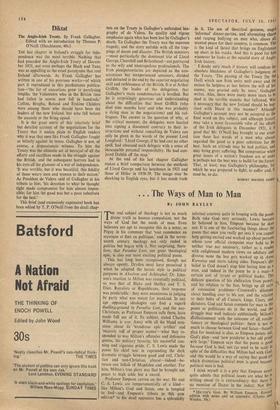Diktat
The Anglo-Irish Treaty. By Frank Gallagher. Edited with an introduction by Thomas P. O'Neill. (Hutchinson, 40s.) THE last chapter in Ireland's struggle for inde- pendence was the most terrible. Nothing that had preceded the Anglo-Irish Treaty of Decem- ber 1921, not even perhaps the Black and Tans, was as appalling as the cruel paroxysms that rent Ireland afterwards. As Frank Gallagher has written in one of his previous works—of which part is reproduced in this posthurnous publica- tion—'the list of executions grew to paralysing lengths, the Volunteers who in the British time had fallen in scores now fell in hundreds.' Collins, Brugha, Boland and Erskine Childers were among those who should have been the leaders of the new Ireland, but who fell before the assassin or the firing squad.
It is the great merit of this relatively brief but detailed account of the negotiations for the Treaty that it makes plain to English readers why it was that men like Frank Gallagher fought so bitterly against its terms. Gallagher is not, of course, a dispassionate witness. To him the Treaty was the ultimate act of betrayal of all the efforts and sacrifices made in the struggle against the British, and the subsequent horrors had in his eyes all the glamour of a war of independence. 'It was terrible, but it was beautiful, this fidelity of those weary men and women to their nation.' As President de Valera said of Gallagher in his tribute to him, 'his devotion to what he thought right made compromise for him almost impos- sible; for him the good was but a poor substitute for the best.'
This brief (and excessively expensive) book has been edited by T. P. O'Neill from the draft chap- tens on the Treaty in Gallagher's unfinished bio- graphy of de Valera. Its quality and vigour emphasise again what has been lost by Gallagher's death. To Gallagher the Treaty was the supreme tragedy, and the story unfolds with all the trap- pings of doom and disaster. The British ministers —most particularly the. dominant trio of Lloyd George, Churchill and Birkenhead—are portrayed as the wily and unscrupulous professionals. The Irish plenipotentiaries are depicted as the con- scientious but inexperienced amateurs, divided and defeated in the end by the superior negotiating skill and ruthlessness of the British. It is at Arthur Griffith, the leader of the delegation, that Gallagher's main condemnation is levelled. But he is surprisingly generous and understanding about the difficulties that beset Griffith (who died nine months later and. who was probably a dying man in the negotiations) and his col- leagues. The answer to the question of why, at the critical moment, the delegates were hustled into signing a document contrary to their in- structions and without consulting de Valera can only be given in the words of the present Lord Longford: 'Lloyd George, if he had cast no other spell, had obsessed each delegate with a sense of inescapable personal responsibility. He had con- jured Dublin off the map.'
At the end of his last chapter Gallagher makes a brief comparison between the methods of Lloyd George and his henchmen in 1921 and those of Hitler in 1938-39. The image may be shocking to English eyes, but it has much truth
in it. The use of theatrical gestures, , staged 'informal' dinner-parties, and alternating charm and rasping bullying on men who, above 011, wanted peace for their country, is common. This is the kind of thrust that brings an Englishman up short in his tracks. And this is good for hill] whenever he looks at the squalid story of Anglo' Irish history.
I doubt very much if history will confirm the absolute bleakness of Gallagher's judgment on the Treaty. 'The passing of the Treaty [by the Dail] which saw Irish unity melt away and the nation lie helpless at last before the will of her enemy, was greeted only by tears,' Gallagher writes. Alas, there were many more tears to be shed in the terrible months that followed. Was it necessary that the new Ireland should be bap' tised with blood in this manner? Although Gallagher's account may not be accepted as the final word on this subject, and although history may take a more favourable view of the efforts of the Irish delegates in December 1921, it iS good that Mr. O'Neill has brought to our atten' tion these last words of a man who always regarded the good as a poor substitute for the best. Such an attitude may be bad politics, and may bring great suffering. But compromise when great issues of a nation's freedom are at stake is perhaps not the best way to build for the future. That, at least, was Gallagher's philosophy, for which he was prepared to fight, to suffer and, if need be, to die.
ROBERT RHODES JAMES




























 Previous page
Previous page